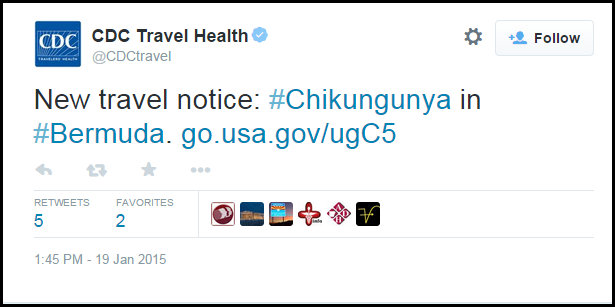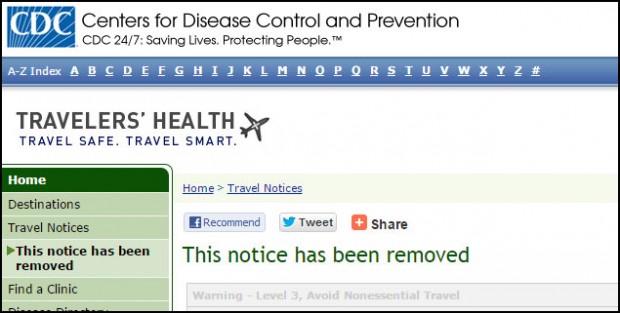CDC Removes Chikungunya Notice For Bermuda
[Updated: Local officials said the CDC statement is "erroneous," they contacted the CDC to request the information be removed, and the CDC removed it from their website at around 6.30pm]
The U.S. Center for Disease Control and Prevention [CDC] has issued a Travel Health Notice for Bermuda, saying the CDC “recommends that travelers to Bermuda protect themselves from chikungunya by preventing mosquito bites.”
The CDC Notice says, “In December 2014, Bermuda reported local transmission of chikungunya. Local transmission means that mosquitoes in the area have been infected with chikungunya and are spreading it to people. This is the first time that local transmission of chikungunya has been reported in Bermuda. Chikungunya cases have also been reported in several countries in the Caribbean and Central and South America.
“CDC recommends that travelers to Bermuda protect themselves from chikungunya by preventing mosquito bites. Some travelers may be more likely to get chikungunya, have severe disease, or be at higher risk for other reasons. CDC advises travelers in high-risk groups to discuss their travel plans with their health care provider.”
Tweet from the official CDC account:
On September 24th, the Bermuda Department of Health confirmed a case of chikungunya in a person in Bermuda who travelled to a country where chikungunya cases have been reported.
At that time, a spokesperson said, “This person was previously known by the Epidemiology and Surveillance Unit at the Department of Health to be a suspected case and, as such, received instruction on avoidance of mosquito bites, as mosquitoes spread the illness.
“Additionally, a referral was sent to Vector Control to increase surveillance and put in place control measures in the area. To date, no local spread of the virus has been reported in the Bermuda, though imported cases make local spread possible because the mosquitoes that can transmit the virus are found in Bermuda.
Update 4.33pm: Following our report, the Department of Health acknowledged the travel notice and said the CDC statement saying there has been local transmission is “erroneous,” and the Department of Health “has today been in contact with the CDC to request that the information be removed.”
“The source of the information used by the CDC has been identified and is also being corrected,” the Department added.
The Department said, “In 2014, three imported cases of Chikungunya were confirmed in Bermuda, with all three individuals having travelled to Chikungunya-affected countries in the Caribbean.
“Investigation by the Epidemiology and Surveillance Unit and proactive measures by Vector Control were implemented to prevent further spread and it was determined that there was no ongoing, local transmission.”
The full statement from the Department of Health is below:
This month the United States Centers for Disease Control [CDC] issued a travel notice for Bermuda in relation to Chikungunya.
The notice states: “In December 2014, Bermuda reported local transmission of chikungunya. Local transmission means that mosquitoes in the area have been infected with chikungunya and are spreading it to people. This is the first time that local transmission of chikungunya has been reported in Bermuda. CDC recommends that travelers to Bermuda protect themselves from chikungunya by preventing mosquito bites.”
The statement is erroneous and the Bermuda Department of Health has today been in contact with the CDC to request that the information be removed. The source of the information used by the CDC has been identified and is also being corrected.
In 2014, three imported cases of Chikungunya were confirmed in Bermuda, with all three individuals having travelled to Chikungunya-affected countries in the Caribbean. Investigation by the Epidemiology and Surveillance Unit and proactive measures by Vector Control were implemented to prevent further spread and it was determined that there was no ongoing, local transmission. The most recent confirmed case was in mid-November.
To be clear, to date, no local spread of the virus has been reported in Bermuda, though imported cases make local spread possible because the mosquitoes that can transmit the virus are found in Bermuda [the Aedes mosquito].
It should be noted however that the Aedes aegypti, which is the kind of mosquito found largely in Caribbean, has not been seen in Bermuda since 1998 having been displaced by Aedes albopictus. However we must continue to remain vigilant in preventing mosquito breeding as Aedes albopictus can also spread chikungunya.
The best way to prevent the presence of mosquitos is for us to increase our vigilance regarding standing water removal. The public is advised to empty any containers of standing water around the home/yard. Buckets, plant pots, tyres, plastic sheeting and other items should be checked and emptied. Otherwise, the water they are holding may act as breeding grounds for mosquitoes. If you need assistance in doing so or need your property assessed, call Vector Control at 278-5397.
With frequent travel between Bermuda and affected areas in the Caribbean, the Department of Health continues to work with health care providers and other regional public health partners to monitor possible imported cases.
The Department of Health wishes to take this opportunity to remind the public that the chikungunya outbreak continues to affect the Caribbean and reiterates the need to reduce mosquitoes locally.
Chikungunya is not transmitted from direct person to person contact, but a person with the disease can be the source of the virus for mosquitoes that can then transmit the virus to others through a bite. To prevent the spread of the disease, people with chikungunya illness should be especially careful to avoid exposure to mosquitoes during the first week of illness.
Infections are rarely fatal but can cause severe joint pain, high fever, head and muscle aches, joint swelling and rash. Symptoms usually begin three to seven days after being bitten by a mosquito. There is no vaccine or treatment for the virus. Most people feel better within a week, though some people may develop longer-term joint pain.
The Department of Health encourages people to protect themselves from mosquito bites at home and while traveling. The Aedes mosquitoes that transmit chikungunya are active and bite during the day. Precautions include:
- Use an approved insect repellent every time you go outside, and follow label instructions.
- Drain standing water where mosquitoes can breed.
- Wear long sleeves and pants when outside.
- Use air conditioning or make sure doors and windows are screened to keep mosquitoes outside.
Travelers to the Caribbean should monitor their health for two weeks after travel. If travelers experience fevers with joint pains or rash they should seek medical attention and inform the health care provider of their recent travel history.
Update 6.36pm: The CDC has just updated their website and Bermuda is no longer listed under the Travel Notice section.
The Travel Notice home page has removed all reference to the notice for Bermuda [before and after photos here], and the page which listed the details of the Travel Notice to Bermuda now shows as “removed”, screenshot below.




How about a proactive program making it simple for members of the public to report standing water ie . Deferred construction with incomplete water tanks, barrels, tires etc.
Develop a simple app that is free to download onto smartphones which allows a photo with Gps coordinates to be sent to Vector. No looking up phone numbers or emails. Quick and easy way for the public to help ward off the spread of this latest virus.
The last thing we need is for this to become a real problem here.
I knew there was something sucking the blood out of Bermudians from 1998.
Couldn’t quite put a finger on the actual cause however…
Quite frankly I don’t like the tweet by the CDC. There may be known cases here for people who have travelled to countries that have Chikungunya but it isn’t proven that the disease has been spread by the insect here in Bermuda.
Developing this app while simple would require a good amount of traction to get people to use it.
It would probably easier to get people to use Instagram or Twitter and hashtag the photos with #Bermuda #Water and include the location data.
And if you see standing water in someone’s yard you could always just walk up to their door and ask them if they could dump it out.
I’d imagine you can report it to Vector Control/Department of Health.
Another blow to tourism
this is supposed to be confined to the Islands in the “South”……..not the “Atlantic……..PLPs fault for 14 years they should have known this was coming
And where are the travel advisory’s to the USA for Eboli, and much more
This needs to be rectified immediately. Why would the CDC report this without consulting with Bermuda first? Totally reckless in my opinion.
People in Bermuda have become complacent over the year.
This does not take away from the situation.
Everyone wants an ‘app’ for something.
Report what you see and clean up your own back yard and empty tins, barrels et al.
Shalom.
Unless the mosquitos fly here from the Caribbean, I don’t see an outbreak anytime soon. This virus has been around for awhile, and so far there have been zero cases locally. The infected people got their bites while overseas, and returned to Bermuda feeling ill. Having said that, it is always good practice to empty any container that can collect standing water.
So who is feeding the CDC false information?